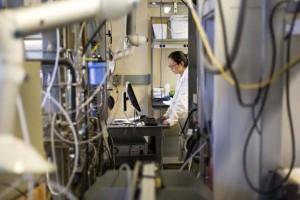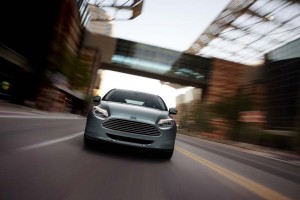Battery power offers some tremendous advantages over the conventional, internal combustion engine. It’s clean, efficient and can slash an owner’s energy bills substantially. There’s just one problem: the battery itself: costly, slow to charge and limited in range.
Coming up with better battery alternatives that can reduce costs, improve range – and yield more appealing battery-electric vehicles and hybrids is the ambitious goal of a new program partnering Ford Motor Co. and the University of Michigan, the Ann Arbor-based campus opening up a new $8 million battery research lab.
“There’s a lot of hunger” for more advanced batteries than are available today, according to Ted Miller, manager of battery research at Ford.
The facility – created with a mix of public and private funding – is designed to handle research that neither traditional battery manufacturers, nor carmakers like Ford, can normally handle. That means developing and testing new chemistries specifically earmarked for automotive applications and focused upon getting any breakthroughs into the market as quickly as possible.
The industry certainly needs some help. While almost every major manufacturer now offers at least one hybrid, with a flood of more advanced battery-electric vehicles and plug-ins coming to showrooms, the technology hasn’t exactly charged up consumers. All told, battery-based vehicles account for less than 4% of the total U.S. new vehicle market. And if conventional hybrids are excluded, the tally is well under 1%.
Proponents insist that volume will increase, perhaps reaching as much as 10% over the course of the next decade, but skeptics are many, and even those caught in the middle contend that without major improvements in battery technology the electric vehicle market could come unplugged – much as happened in the 1990s when California regulators first tried to enact a Zero-Emissions vehicle mandate and found that the batteries of that era couldn’t come close to meeting customer expectations.
(Cadillac launching new ELR plug-in hybrid early in 2014. Click Here to find out more.)
Automakers have largely abandoned the lead-acid technology of that era and are rapidly migrating from newer nickel-metal hydride, or NiMH to the current state-of-the-art lithium-ion batteries. But there is talk of still newer technologies, such as lithium-air.
“It is way too early in the battery race to commit to one type of battery chemistry,” said Miller. “Others in the auto industry have placed their bets, but we are convinced a better solution will require input from a multitude of partners.”
(Toyota is the latest battery-carmaker cutting prices to boost demand. Click Here for more.)
Ford isn’t the only company looking for options. Toyota, for example, has resisted replacing NiMH batteries in its hybrid models, such as the popular Prius, and the company hints it is working aggressively on a battery chemistry that could leapfrog lithium-ion.
But the question is how quickly? Many in the auto and battery industries fear that could take another decade or more – longer than needed to charge up a more mainstream market for electric propulsion.
(Tesla CEO insists Model S electric is safe despite battery fire. Click Herefor the latest.)
The problem is that, “We have battery labs that test and validate production-ready batteries, but that is too late in the development process for us to get our first look,” said Ford’s Miller. “This (new University of Michigan) lab will give us a stepping-stone between the research lab and the production environment, and a chance to have input much earlier in the development process. This is sorely needed, and no one else in the auto industry has anything like it.”
The facility will not only provide potential battery breakthroughs, but also serve as a training ground for the auto industry’s next generation of battery engineers – Ford hoping it gets first crack at hiring the cream of that crop.



This is basically a desperation move as all major car makers selling in the U.S. will be forced to dump EVs into the marketplace to reduce fines for the outrageous 54.5 mpg CAFE number Obama and the EPA pulled from their orifice and which is impossible to meet. What a toxic nightmare the U.S. will have to deal with when all of these lithium ion batteries need to be disposed of as EVs end their short lives and end up at recyclers.